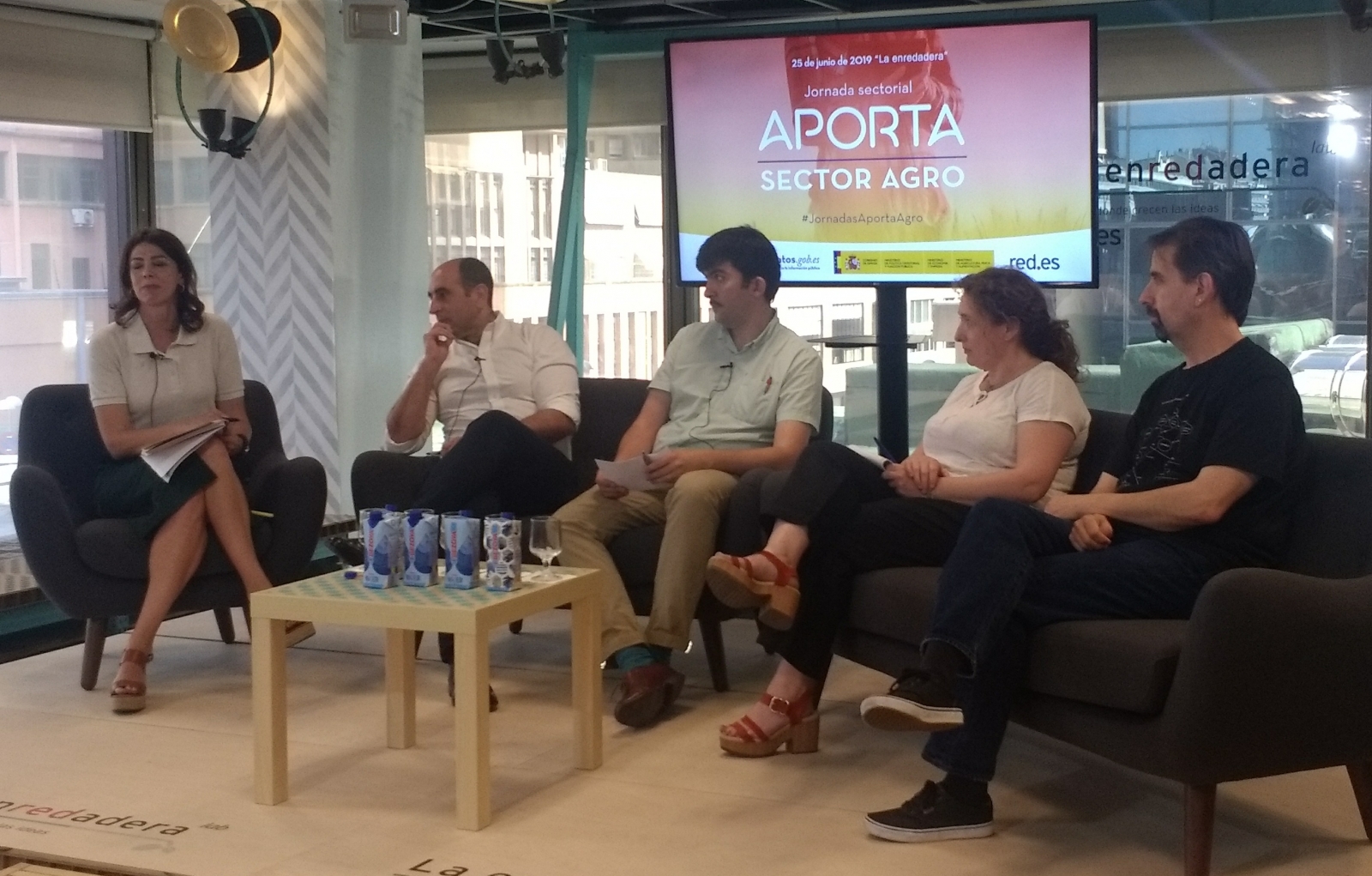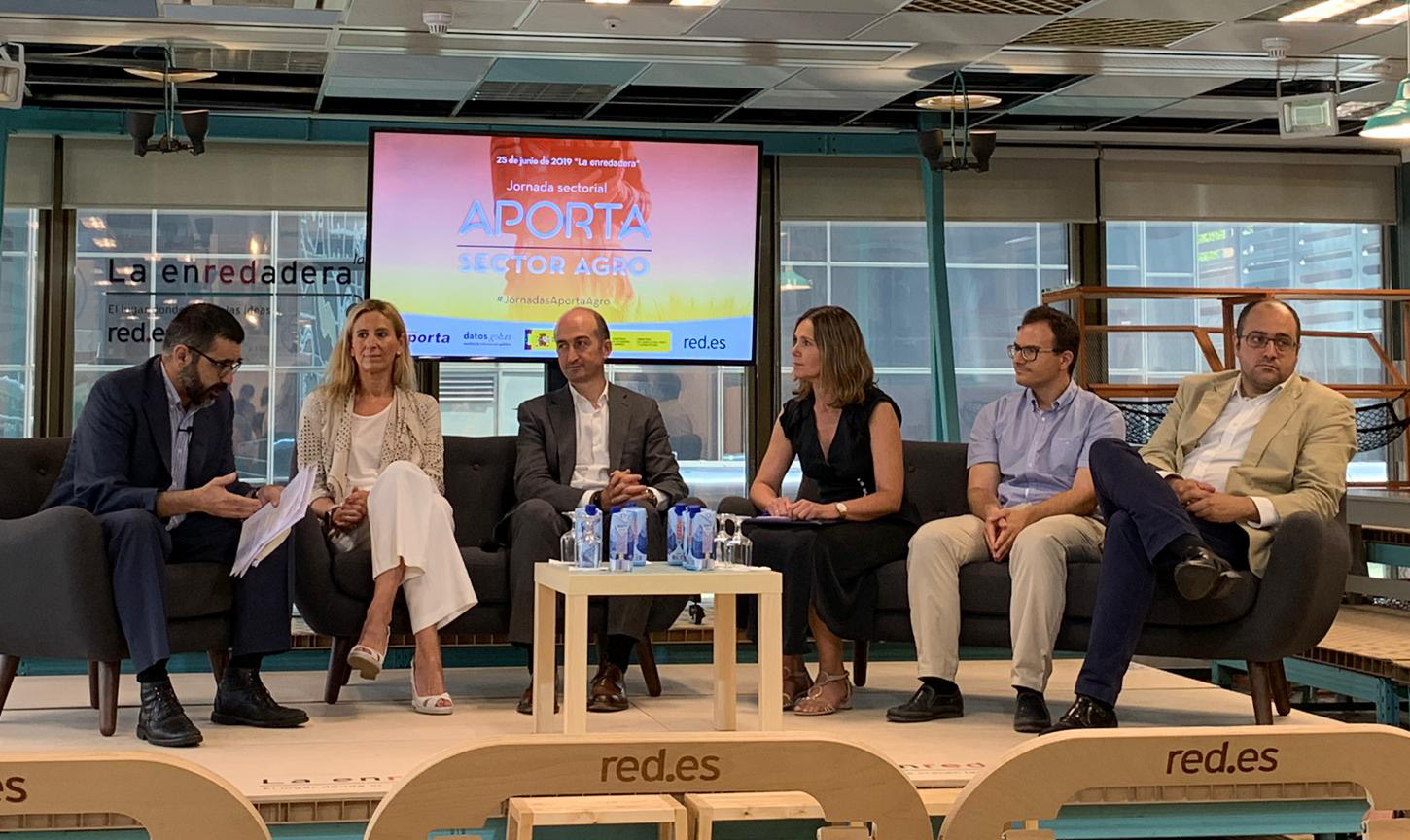Conclusions of the Aporta Sectorial Conference: Agro Sector
Fecha de la noticia: 04-07-2019

On June 25, a Sectoral Seminar focused on the Agro sector took place. Under the slogan, "Open data in the process of digital transformation of the agri-food, forestry and rural areas", experts analyze the availability of data and disseminate new technological initiatives that are achieving improvements in the sector thanks to the reuse of public information.
The event was opened by David Cierco, CEO of Red.es, highlighting the importance of data reuse in rural areas to generate economic activity and attract people. After the presentation, the first of the two round tables of the event took place.
Round table 1: Data for innovation development in the agricultural sector
The objective of the first round table was to make a balance on the availability of data in the sector and its alignment with the needs of the reusers. Moderation was provided by Rocío Wojski, from the Ministry of Agriculture, Fisheries and Food (MAPA), and the speakers was Andrés Montero, from the Carlos III University of Madrid, Antonio J. Sánchez-Padial, from the Ministry of Science, Innovation and Universities, Francisco Javier Zarazaga-Soria, from the University of Zaragoza, and Paloma Abad, from the National Geographic Institute.

Rocío Wojski opened the debate by talking about two major challenges for farmers: satisfying food requirements in a sustainable way and reinforcing their role as an engine for development in the rural world, two challenges where open data has a lot to say. Of all the data categories, the speakers highlighted the importance of the sector data with geographic components and research data to overcome these challenges.
Geographical data is the second most reused data category, and its publication is being driven by the INSPIRE Directive. "The Geographical Institutes were already aware, but INSPIRE has been useful to raise awareness among other administrations", said Paloma Abad, who also added that "In Spain we are 80% compliant with INSPIRE”.
In addition, the publication of open research data is also being driven by legislation. In this case, by the new European PSI directive. Although in Spain we already had a positive outlook in terms of scientific publications (thanks in part to the Science Law of 2011), now "research data financed with public funds will have to be published for reuse", said Antonio J Sánchez-Padial. "In addition, it is necessary to promote other types of incentives and encourage collaboration, something that organizations such as INIA or FECYT are already doing through collaboration frameworks".
But not all data can be opened. "Data generated in the university field should be offered, but there will be exceptions: sometimes the information comes from third parties who have not transferred the rights of use" reminded Francisco Javier Zarazaga-Soria.
Another topic analysed during the event was the training offer. All attendees agreed on the importance of having data professionals specialized in the agricultural sector and interested in developing their career in rural areas. "Hybrid profiles are needed at university level, mixing degrees that cross the data processing component with more traditional degrees such as economics, biology..." said Francisco Javier Zarazaga-Soria. "In addition to formal education, we must also emphasize continuous training, aimed at professionals who want to recycle or update their knowledge", pointed out Andrés Montero.
Finally, the speakers focused on the importance of aligning data supply with demand. In the words of Paloma Abad, "it is necessary to know the end user very well in order to know what he needs: immediacy, detail, which formats are the most appropriate for his work ... This way we can adapt the information we put at his disposal".
To understand these needs, alliances between the administration and companies are fundamental, for example through Data innovation hubs, whit different actors, such as farmers, cooperatives, administration, etc. "The sector have a lack of knowledge about what already exists. These environments facilitate the identification of data that may be necessary and help to align strategies" commented Andrés Montero. The new European Directive on open data and reuse of public sector information can help in this regard: it indicates "high-value data sets" that publishers must share according to formats and conditions that favour their reuse. "We also have to take into account that the data clients are going to be machines, we have to generate data that allows the algorithms to work easily" reminded Francisco Javier Zarazaga-Soria.
Rocio Wojski closed the debate by indicating the most visited data sets of the Ministry of Agriculture, Fisheries and Food: the Operational Fishing Fleet Census, the Register of Animal Feeding Establishments, the Fertilizer product register, the Registration of organic farming operators and the Sigpac. From the MAPA, they are also promoting the internal data collection and analytical projects to offer high quality information to the productive sectors.
Round table 2: Innovative practices based on data
The second roundtable, which sought to publicize public data reuse initiatives that are promoting improvements in the agricultural sector, was moderated by José Ignacio Sánchez, from Red.es. José Luis Molina, from Hispatec, Mercedes Iborra, from VisualNACert, Carlos Callejero, from SensoWave, Eva Navascués, from Pago de Carraovejas, and Guillermo Renancio from EFOR debated with him. All of them told about their experience implementing emerging technologies based on open public information to optimize the agricultural sector.

SensoWave is focused on GPS tracking on the cattle, using Internet of Things (IoT) and Blockchain technology. Through sensors, SensoWave monitors from the animal's location to its body temperature or its interactions with the environment to provide transparency to the consumer. "These data can be very useful if they are shared, but for this we must convince the farmer and guarantee that the information will be anonymous", said Carlos Callejero.
Mercedes Iborra, from VisualNacert, a company specialized in a platform that unifies farmers' own data with open data from different sources, such as the Copernicus program, took a stance along the same line. Mercedes highlighted "the culture of change in the top direction of agribusinesses and the fear of the farmer who generates the data and does not know how they are going to be used" as two of the challenges to be faced in order to promote the digitalization and use of data in the agricultural sector.
Pago de Carraovejas, for its part, applies new technologies to the wine sector for almost 10 years. In this time, they have sensorized the strains and the different elements of the environment. Thanks to these data, they have developed predictive analytics projects to minimize the impact of vine wood diseases or predict the quality and quantity of the harvest. One of the challenges that they have found in this path is financing. "One solution is to open public R & D funding programs that make easier to test new things", Eva Navascué suggested. "These programs could be low-intensity but prolonged in time, and should always go hand in hand with private companies", added José Luis Molina from Hispatec, an agricultural management software company with a focus on data analysis.
The financing challenge is accentuated if we take into account the Spanish agrarian structure, with a large number of plots of small size. "It is necessary to democratize technology through general solutions that are economical and can be implemented by many small producers", commented Guillermo Renancio from eformedia, a company that develop Internet of Things solutions to save time in decision-making. Other key issues that the attendees highlighted to promote the digitization of the sector are regulation and tax incentives.
In addition, the importance of having a universal connectivity, which allows connecting not only people, but also animals and crops, and standards that allow sharing data was also discussed. This requires platforms that integrate the data from different sources, ensuring their quality. It was also stressed that it is necessary to implement mature solutions linked to new economic activities for the rural world. "Rural and agricultural world have been divorced for a long time, so it is necessary to also develop other economic activities that can attract people to the rural world", commented José Luis Molina, from Hispatec, an agricultural management software company focused on data analysis.
Another important issue is sustainability and respect for the environment. "When we created a technology company in the agricultural sector, we have to take into account 3 clients: the final consumer that seeks transparency, companies that seek profitability and the environment, a passive and silent client, but which requires to be very careful" he also commented.
The event ended with an call from all the participants to continue promoting the digitalization and reuse of open data in the agricultural sector, a task that requires that public administrations, private companies and other stakeholders of the Spanish agrarian ecosystem join forces.
You can see the full event in the following videos:











